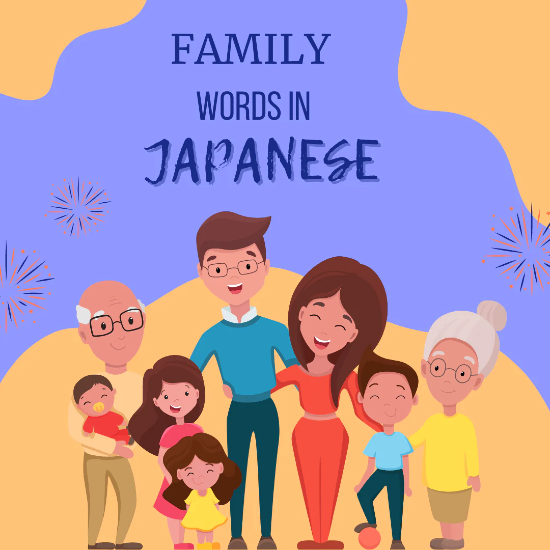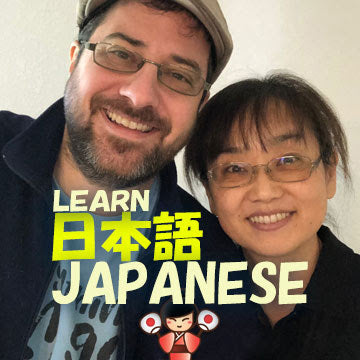I want to give you a brief overview of how Japanese words change depending on the context, however, if you are here just to get a vocabulary list, no problem! Scroll down to "Vocabulary List" for that and/or download the free PDF (plus sound files and Anki deck) by clicking here.
The link is to a Dropbox folder where you can download everything or open individual files.
Family Terms in Japanese
Understanding and using family words in any language can be complex and nuanced, and Japanese is no exception. Japanese family terms go beyond the basic mother, father, brother, and sister, offering a rich array of designations based on age, gender, and marital status.
This article will introduce you to the basic family words in Japanese and provide some insights into their usage and cultural context.
Interested in learning more about Japanese? See the last page of the PDF in the free download for a special coupon to get $5 off anything at TheJapanShop.com.
Basics of Family Words in Japanese
You may know that many words in Japanese have multiple versions depending on:
- Who is speaking
- To whom he or she is speaking
- and the level of formality of the occasion.
Uchi and Soto
Think of it as two circles:
- One for talking about your own family to others (uchi, or "my house (circle of friends and family)"),
- And one for addressing others' family members (soto, or "outside").


The former is more informal, while the latter is considered polite. For instance, "haha" is used to refer to your own mother, while "okaasan" is used when talking about someone else's mother. But both haha and okaasan mean “mother.”
Vocabulary List
Let's start with the main family words and then we will break it down into the nitty-gritty regarding usage.
- 家族 kazoku family
- お父さん otousan father
- お母さん okaasan mother
- 両親 ryoushin (both) parents
- 息子 musuko son
- 娘 musume daughter
- 兄 ani older brother
- 弟 otouto younger brother
- 姉 ane older sister
- 妹 imouto younger sister
- おじいさん ojiisan grandfather
- おばあさん obaasan grandmother
- 夫 otto husband
- 妻 tsuma wife
- 赤ちゃん akachan baby
- 義理の父 giri no chichi father-in-law or stepfather
- 義理の母 giri no haha mother-in-law or stepmother
- 継子 mamako stepchild [The "mama" here doesn't mean "mother" but rather "to inherit" or "to continue" or "to succeed"]
The above lists the most common and useful terms of family relationships. However, it should be noted that there are different words used whether you are talking about your own family or talking about someone else’s family. Japanese also distinguishes between older and younger siblings.
And… there are many more kinship terms one might use. For example, a wife speaking to her friend might call her husband うちの人 uchi no hito [literally, our (family's) person], but this list covers the most useful words. (Want to know a distant family term? Leave a comment below and we will be sure to add it!)
When to Use What Word?
As I mentioned at the top, these family terms have an honorific (尊敬 sonkei) and humble (謙譲 kenjou) form. Which one to use is determined by who you are speaking to and how formal the situation is.
Here are a few situations:
- Referring to someone else's family [honorific]
- Referring to one's own family members in a casual situation (among friends) [honorific or other terms]
- Referring to one's own family members in a formal situation or to people with a higher status (your boss) [humble]
- Speaking to your family members directly [somewhat honorific except for younger siblings; you may use the more casual ちゃん honorific instead of さん]
TERMS OF FAMILY RELATIONSHIP
|
|
Referring to someone else's family |
My family (casual with friends) |
My family (formal) |
To my family members |
|
Father |
お父さん |
お父さん |
父 |
お父さん・パパ |
|
Mother |
お母さん |
お母さん |
母 |
お母さん・ママ |
|
Older Brother |
お兄さん |
お兄さん・ |
兄 |
お兄ちゃん |
|
Older Sister |
お姉さん |
お姉さん・お姉ちゃん |
姉 |
お姉ちゃん |
|
Younger Brother |
弟さん |
弟 |
弟 |
Given name |
|
Younger Sister |
妹さん |
妹 |
妹 |
Given name |
|
Grandfather |
おじいさん |
おじいさん・おじいちゃん |
祖父 |
おじいちゃん |
|
Grandmother |
おばあさん |
おばあさん・おばあちゃん |
祖母 |
おばあちゃん |
|
Husband |
ご主人 |
旦那 |
主人・夫 |
お父さん |
|
Wife |
奥さん |
奥さん |
妻・家内 |
お母さん |
Age and Status
Age and status play a significant role in Japanese language and culture. When addressing family members, it is customary to include honorifics that denote respect. For instance, "-san" is a general honorific used for both genders and all ages. It shows respect and is similar to "Mr." or "Ms." in English. Other honorifics include "-chan" (used for girls, close friends, and pets), "-kun" (used for boys and close friends), and "-sama" (a more respectful version of "-san").
Moreover, words can change depending on whether you're an older or younger sibling. For example, an elder sibling would refer to their younger brother as "otouto," while the younger brother would refer to their elder sibling as "ani" or "oneesan" depending on the gender.
For more on name honorifics, see our free lesson page here:
https://thejapanesepage.com/what-does-san-mean-japanese/
As mentioned before, honorifics are often attached to family words to show respect. However, they are not typically used when referring to your own family members in conversation with outsiders, as it might be seen as arrogant. On the other hand, you should use honorifics when addressing or referring to someone else's family members.
You might be thinking why say the honorific among friends? Using the humble form would place you beneath the person with whom you are conversing. But you can also use other non-honorific terms (such as the above mentioned うちの人 uchi no hito for one's husband or うちの子 uchi no ko for one's child).
The other question you might have is why not use honorifics for younger siblings? The terms are from the perspective of the younger child. This is because Japanese culture highly values age and experience. Younger siblings use the honorific titles for the older siblings, but younger or equal siblings are usually simply addressed by their given name.
In Yumi's case, she has a younger brother and a younger sister. Since she is the eldest, her mother calls her お姉ちゃん oneechan, but her younger siblings are called by their given names.
Conclusion
Family words in Japanese offer a fascinating insight into Japanese culture and society, revealing the importance of respect, hierarchy, and relationships. However, they can be complicated for learners due to the dual system of uchi and soto words, and the need to choose the correct honorifics. With practice and patience, learners can master these terms and gain a deeper understanding of Japanese language and culture.
----
Download this lesson free of charge by clicking here.






